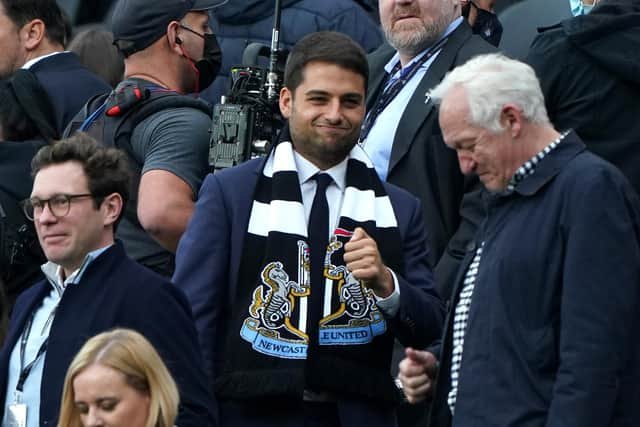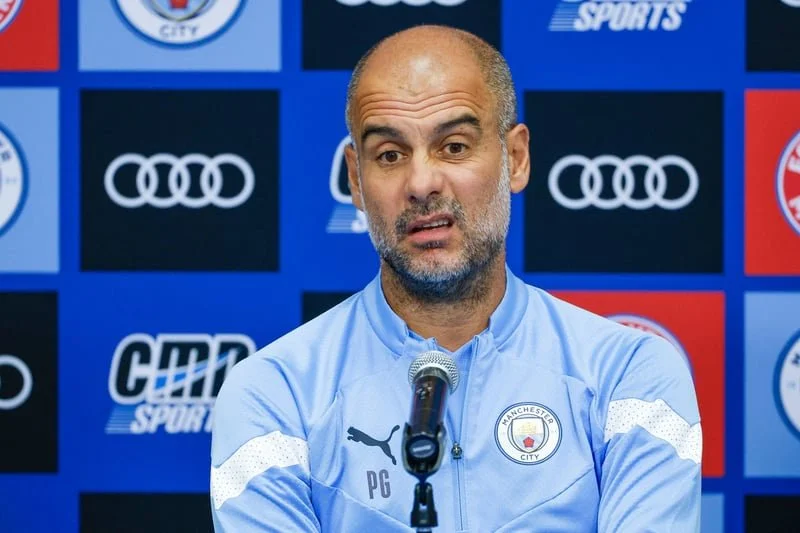Man City and the Premier League at odds - Part One: Man City take legal action
On June 10th, 2024, The Premier League and Manchester City began a two week arbitration hearing to assess the validity of Associated Party Transaction (APT) rules. The verdict of this arbitration was delivered on September 23rd, which was in the midst of another hearing between City and the Premier League. In this second case, Manchester City are combatting allegations that they broke established Profit and Sustainability Rules (PSR). This case is ongoing, and is slated to take 10 weeks.
But before we discuss the chaos of current times (emergency PL meetings, protesters, and provocative digital signs), let’s back up and discuss - how did we get here?
Outside the Premier League headquarters, which is headed by Richard Masters, Premier League CEO. (X, @TheOSC8)
The APT hearing and PSR arbitration both involve the Premier League and the reigning treble champions, Manchester City, and are centered around several financial rulings that teams are required to abide by. This legal double-header is attempting to answer the questions: Have City broken PSR rules? And are APT rules fair?
Financial regulations have been a part of club operations for over a decade, with UEFA’s Financial Fair Play (FFP) rules in effect since 2011. FFP was established to prevent clubs from spending more than they were earning. It orders clubs to comply with “break-even” requirements, moderate debt accumulation, and “improve overall financial health of European club football,” according to UEFA. FFP came to be after many years where top-division clubs were accruing significant debts, which at one point totaled over €1 billion.
Following suit, the Premier League created its own offspring of the FFP regulations - Profit and Sustainability Rules. City are being charged with 115 counts of rule-breaking when it comes to the PSR. This is the case currently underway.
As for the introduction of Associated Party Transaction rules, we need to talk about Newcastle United.
On October 7, 2021, after many hurdles and legal promises, Newcastle was acquired by Saudi Arabia’s Public Investment Fund (PIF). The deal was arranged by Amanda Staveley, a chairman of PCP Capital Partners, which became a 10% stakeholder as part of the takeover. The Reuben family acquired 10%, and the majority 80% was taken by PIF. The three parties acquired Newcastle as a consortium for £305 million.
Although the chairman of PIF is Saudi Arabian Crown Prince, Mohammed bin Salman, the Premier League received assurances that the club would be owned by PIF, and not the Kingdom of Saudi Arabia. Yet, the BBC describes PIF as “essentially a state savings account for the Saudi Arabian government.”
Within days of the takeover, a Premier League emergency meeting was held, as requested by other Premier League clubs. This meeting, and subsequent gatherings, resulted in the adoption of Associated Party Transaction rules in December of 2021. These rules were passed with a majority vote, as well as being approved by the Football Association.



Prior to the adoption APT rules, there were guidelines around “related party transactions” in the PSR section of the Premier League handbook. These rules are intended to prevent rich ownership from making concealed payments to their clubs through overpriced sponsorship dealings. The newer APT rules are stricter than related party deal regulations, but how are they different exactly?
Under APT laws, all associated transactions will be assessed by an independent firm to determine if they are of “fair market value” (FMV) before the deal can be made. Previously, deals would be assessed only if the PL Board deemed it necessary, and this was after team accounts were published. Often, it was also after the transaction was made. In addition, now all deals over £1 million will be assessed for FMV, regardless of who the deal is with.
With APT rulings, it is the responsibility of the clubs to provide proof that their transactions are of FMV. Clubs cannot challenge the rulings. During the assessment of the proposed transaction, which is performed by Neilson Sports, databank comparisons are sometimes used. This process takes into consideration other clubs and their deals as markers for what is fair.
If a transaction is deemed unfair, the PL has the option to provide a “restated value” for the deal, and a price that they believe is of FMV. If the club and their sponsor still plan to come to an agreement, the amount cannot exceed the restated value.
The APT assessments are time-consuming and can delay clubs from making deals, and therefore limit their ability to generate revenue. This is just one of many reasons why City are averse to these new laws.
In June of 2023, under ATP approval, Newcastle signed a Sela shirt sponsorship for £25 million. Sela is a Saudi Arabian entertainment and hospitality company owned by PIF. Shirt sponsorship is a common example of how ownership can make related deals with their team. Another example of this is Chelsea’s sponsorship with Infinite Athlete, a sports data company linked with Chelsea owners Todd Boehly and Clearlake Capital.
Sheikh Mansour, Manchester City’s owner, is connected to 4 out of 10 of City’s sponsors, including Etihad Airways. Etihad is the sponsor of their team shirts and their stadium. Mansour is the vice president and deputy prime minister of the United Arab Emirates, and his family has a net worth of nearly £240 billion, making him the richest owner in the sport. Mansour’s brother, Mohamed bin Zayed Al Nahyan, is the current president of the UAE. Etihad Airways was founded and has been chaired by members of this ruling family.
City’s shirt sponsorship with Etihad is the most valuable in the league, valued at £67.5 million for the 24/25 season.
There were rumors even prior to the adoptions of ATP that a club, now known to be City, was threatening legal action over related party transactions. Now with APT in place, City believe these rulings and assessment of sponsorships is not right, and finally submitted their case against the Premier League.
Mohamed bin Zayed Al Nahyan and Sheikh Mansour (Getty Images)
Manchester City’s arguments against the APT regulations, came in a 165-page legal document, filed in February of this year. Many claims can be made in a 165 page document, so here are some highlights of why, in the eyes of Manchester City, the APT rulings are discriminatory and anti-competitive.
The APT rules were passed by rival clubs in hopes to curb City’s success. A 2/3 majority vote is unfair and more specifically, a “tyranny of the majority.”
These rules were passed due to discrimination of Gulf ownership. Especially considering the timeline of their adoption, immediately following the Newcastle takeover.
City think they should be able to value their sponsorship deals as they see fit, as it has not been proven that having more money from sponsorship deals directly impacts competitive fairness.
The Premier League is safeguarding it’s own financial investments, as they also have links to potential sponsorships.
City are at a financial disadvantage because their stadium is not in London where they can have higher ticket prices.
They counter the claim that their sponsorship deals will dissolve if they change ownership. Stating that sponsorships will be honored regardless.
FMV only applies to sponsorships and not shareholder loans, which is an unfair distinction.
The APT rules impact their ability to buy top players, which will in turn require them to charge their fans more for tickets. In addition, it could affect how they fund women’s football, youth training, and their community contributions.
City sued for damages as part of this arbitration. They claim that the FMV assessments resulted in losses due to delays, and they were unable to receive funds from agreed deals in a timely manner. They also will make less money from deals that they believe should be valued at higher amounts. It is believed that these alleged damages could amount to over £10 million.
Despite City claiming that these rules have impacted their competitiveness, they have won the last four Premier League titles and spent close to £2 billion to create a team. As for ticket costs, Manchester City are third on the list of ticket income when compared to the six London teams. Another counter point to their argument is that in many sponsorship deals made, there are clauses that the sponsorship terms can change if new ownership is established.
Pep Guardiola (Manchester World)
When City filed their case, they already had a scheduled arbitration hearing with the Premier League, facing the 115 charges for breaking PSR. The timing of these two cases is not a coincidence, with City’s case against the PL appearing as a counter attack that could aid their case in the upcoming PSR hearing. It was speculated that their motivation was to make some wins prior to their PSR hearing, as well as utilize the resources and time of the Premier League.
Compared to previous years, the Premier League has now spent more than four times the amount in legal bills. In addition their legal team had to dedicate their attention to the two-week APT arbitration, removing focus from the (now current) PSR hearing.
The PSR hearing could lead to major fines for the club, and even has the potential to strip them of titles and force relegation. A win for City in the APT hearing could mean changes for FFP laws, and an undoing of the rulings that they are accused of breaking.
So what will be the results of the APT hearing? Thankfully there is no need to wait. For a breakdown of what happened in this case, and what’s at stake in the current PSR hearings, you can catch up with Part Two (coming soon)!
Sources: CNN | BBC II | The Times I II III | Premier League | The Guardian | UEFA | Wikipedia
*In February of 2024, Amanda Staveley and her husband, Mehrdad Ghodoussi, relinquished their ownership share of Newcastle United, now leaving PIF with 85% stake and the Reuben Family with 15%.
*In March 2024, updates were made to APT rules. They passed by a majority vote.







